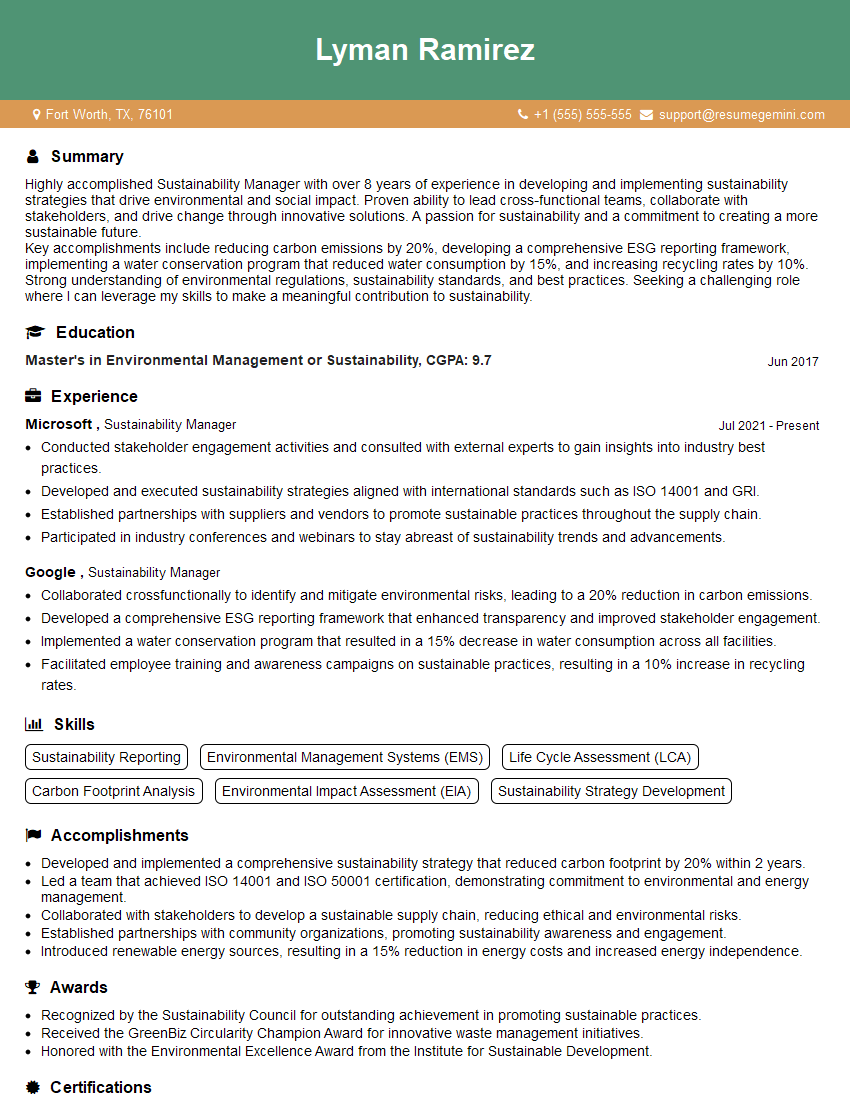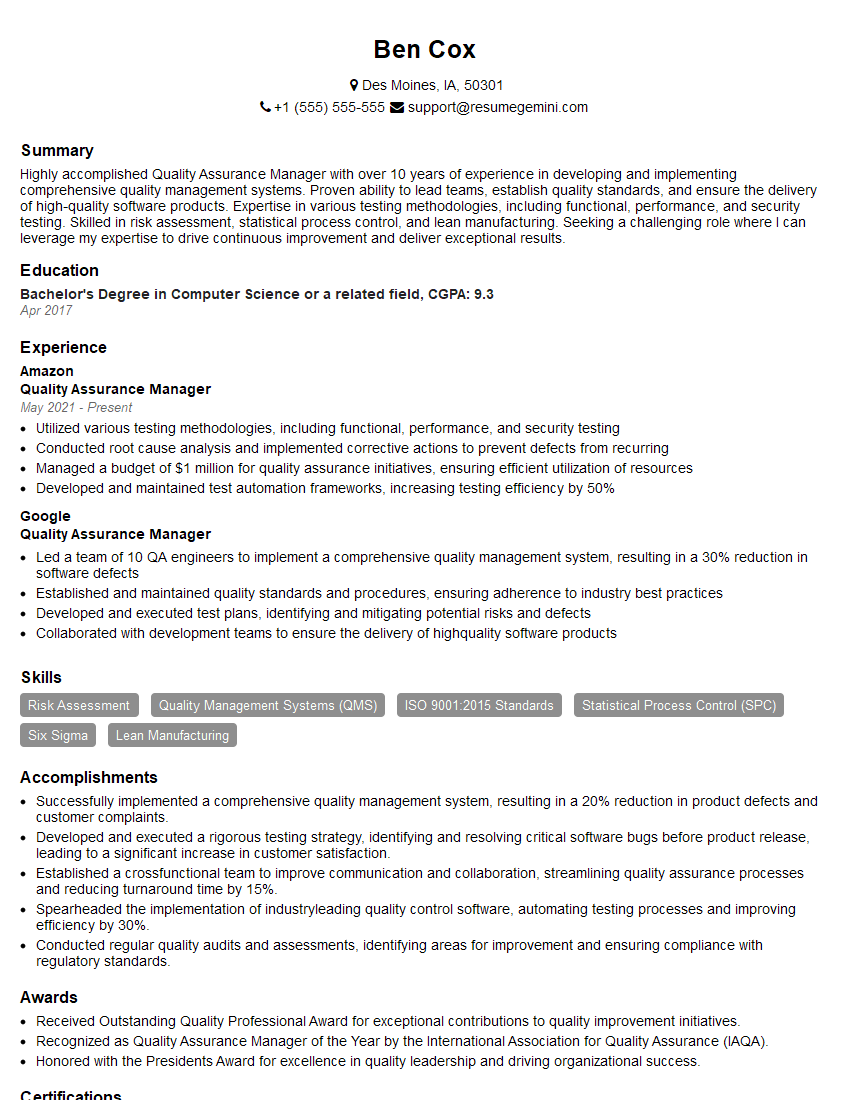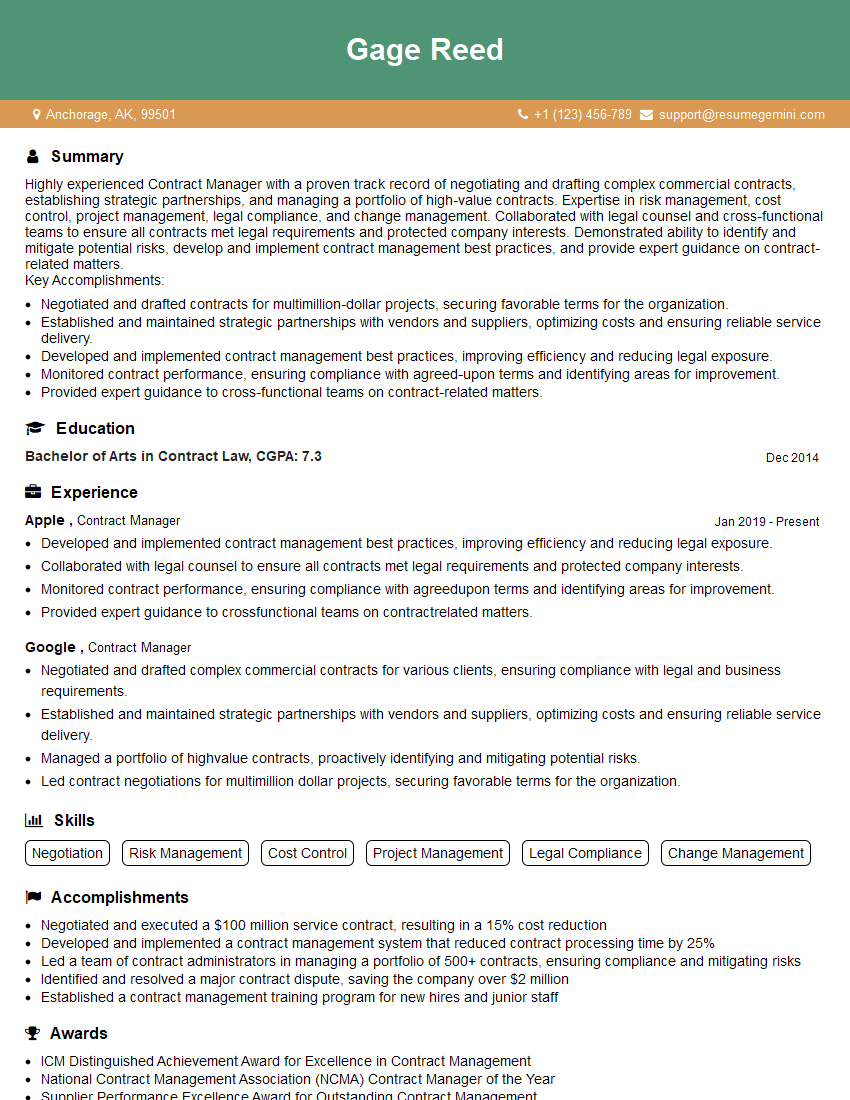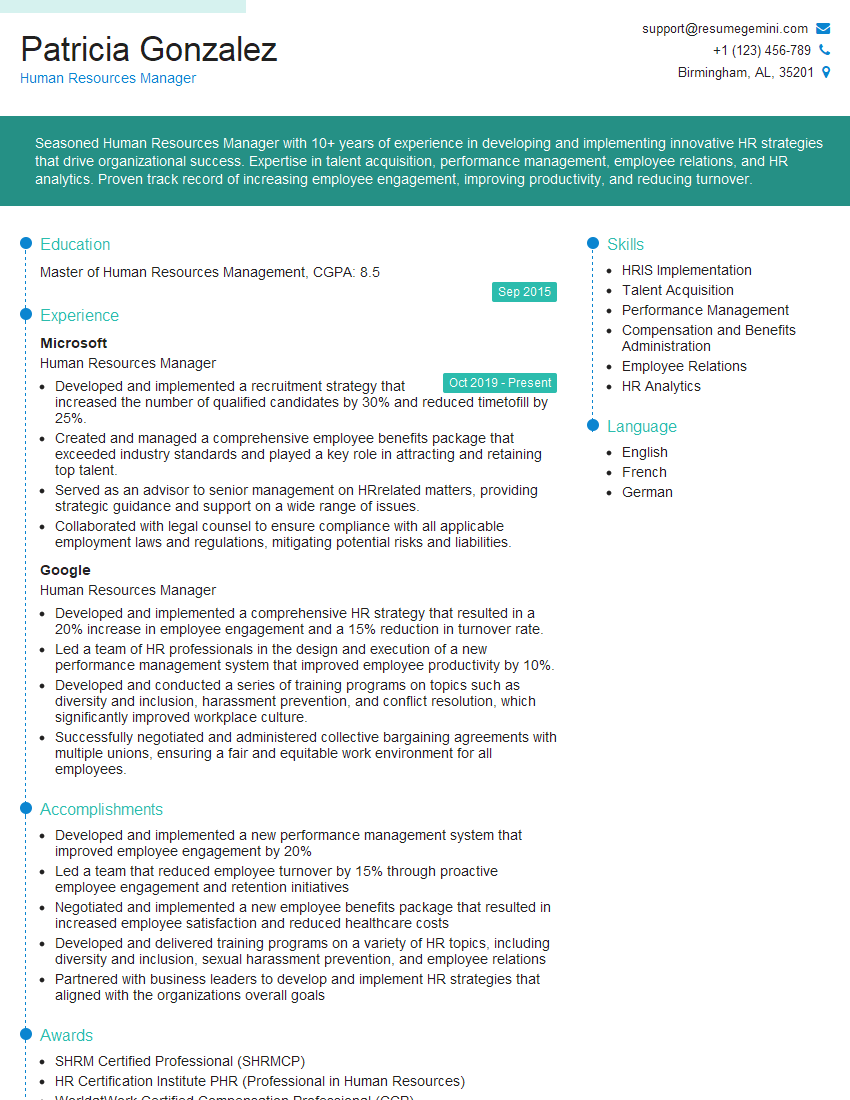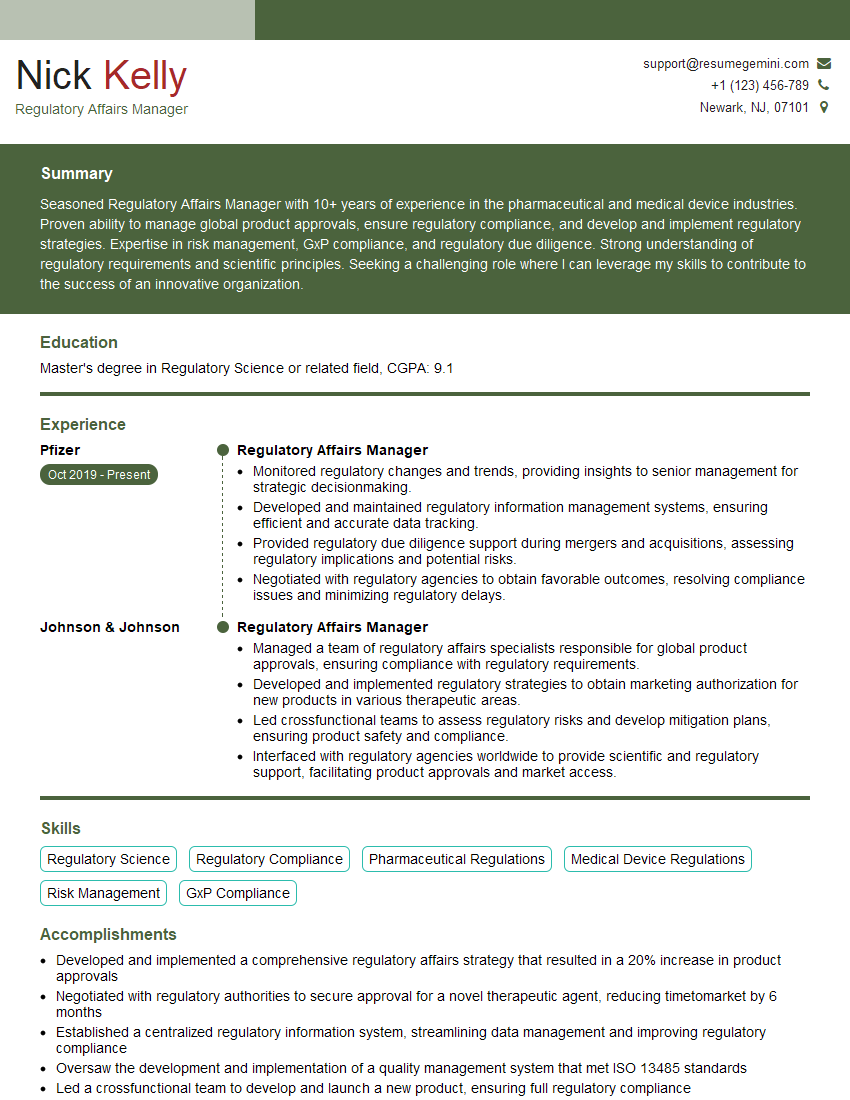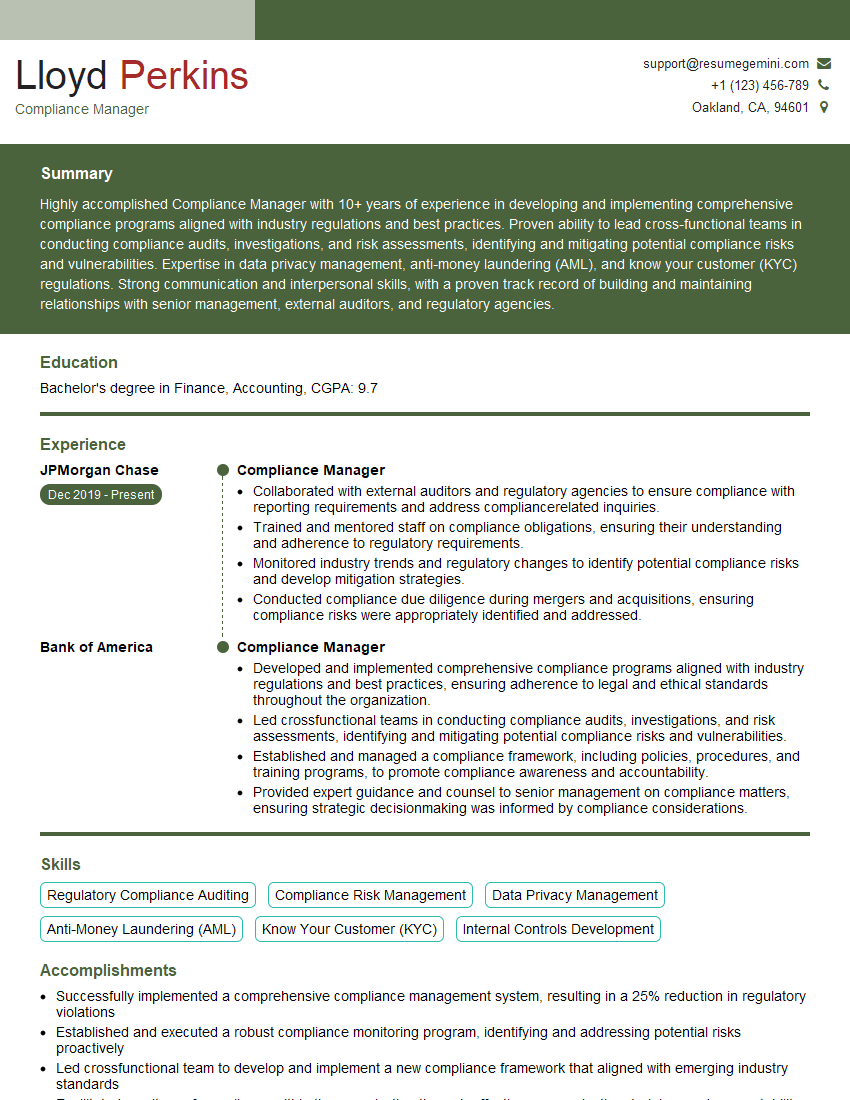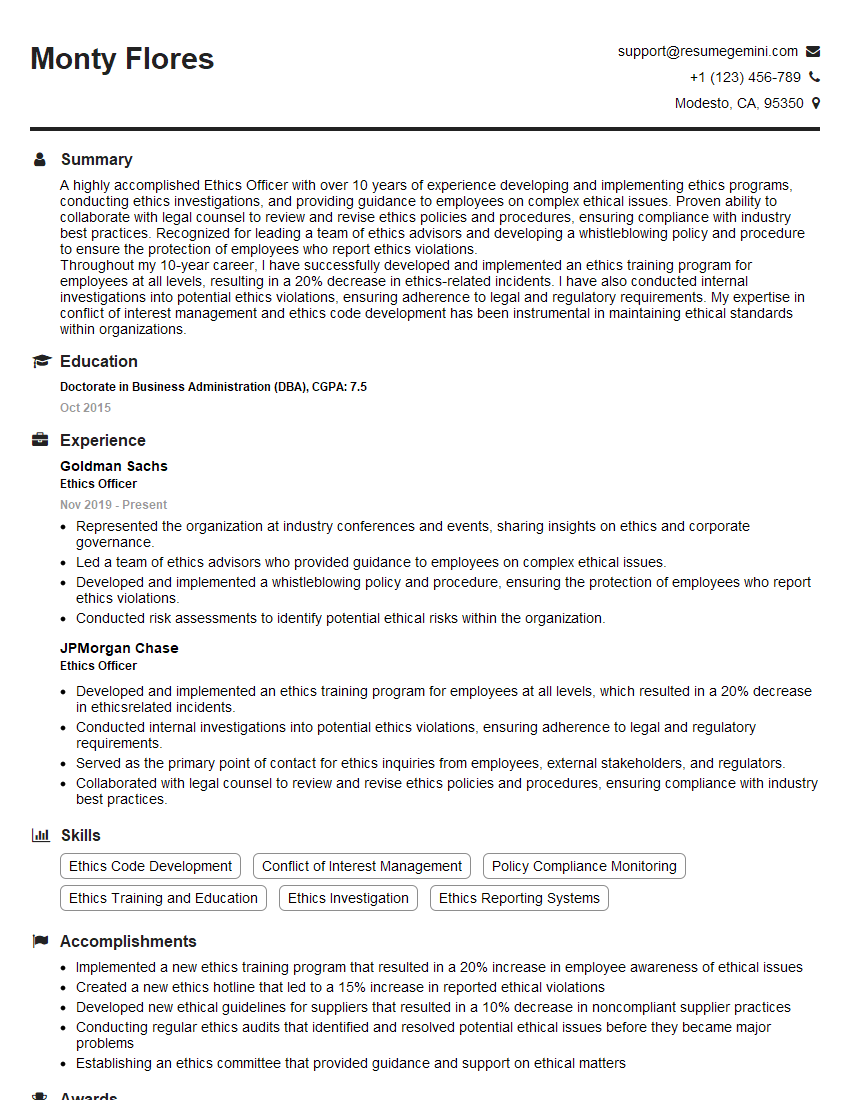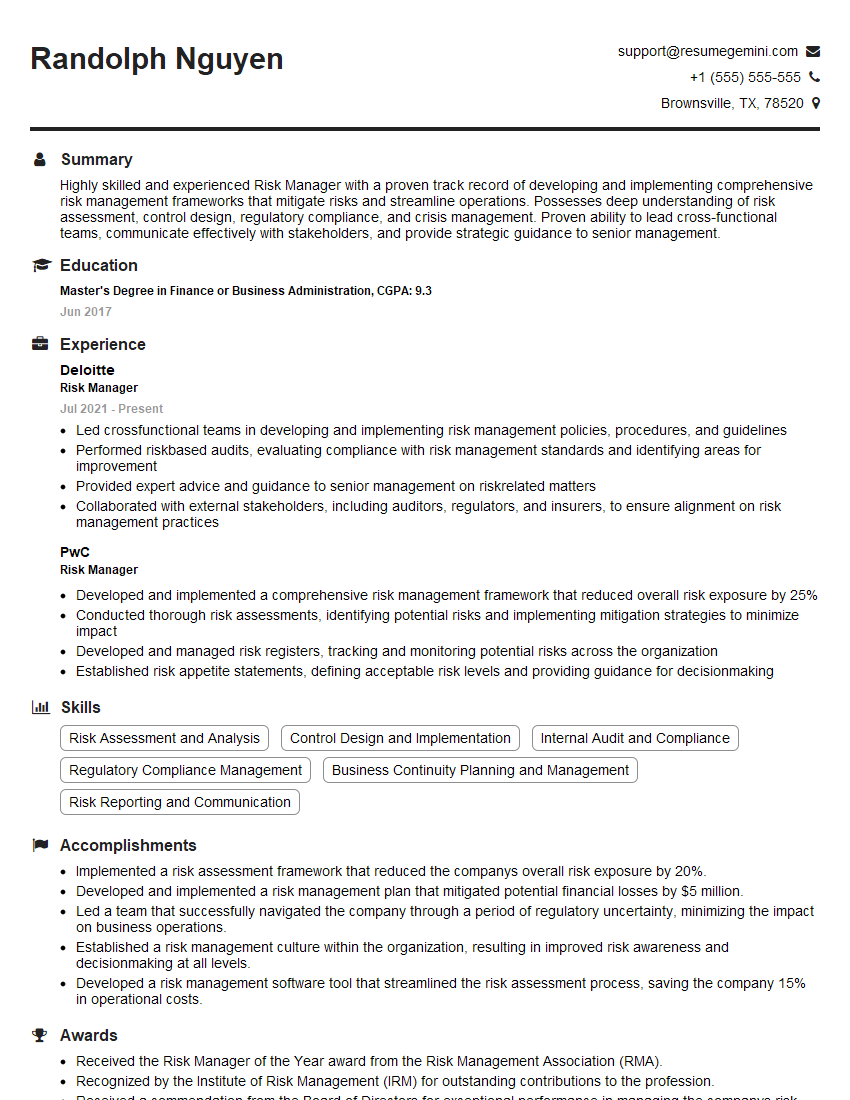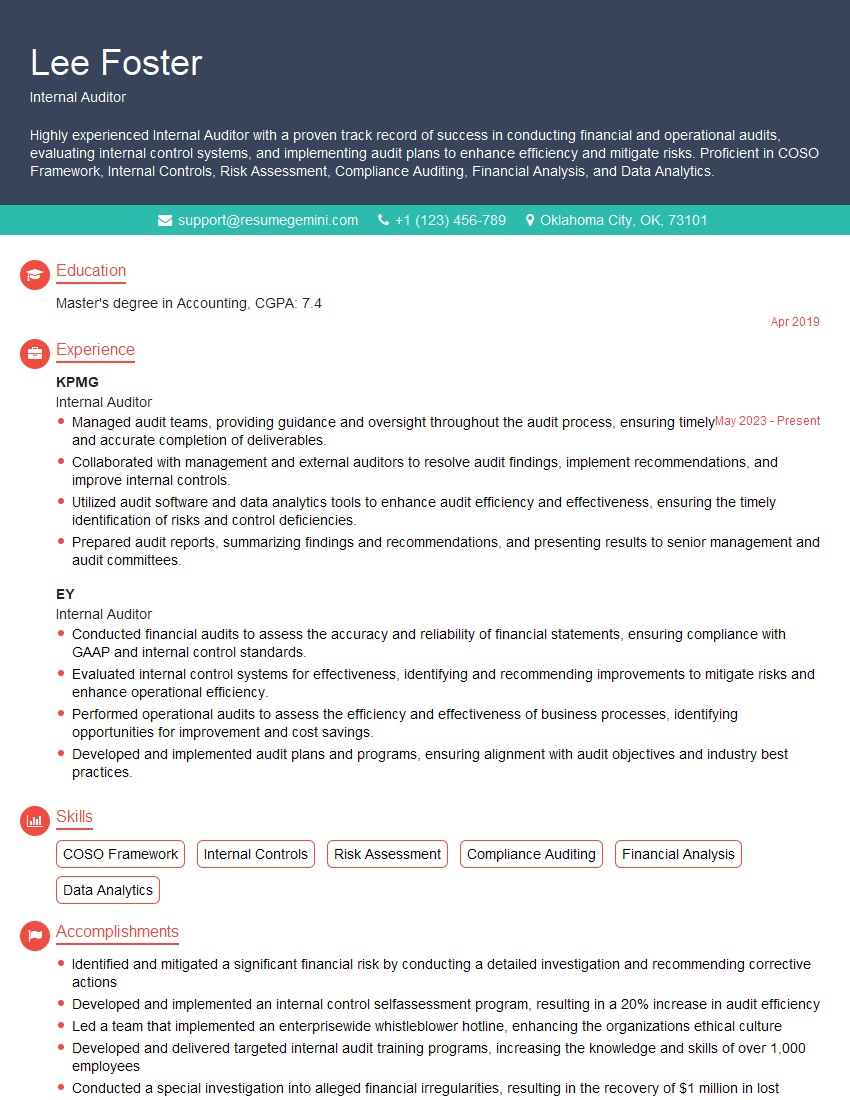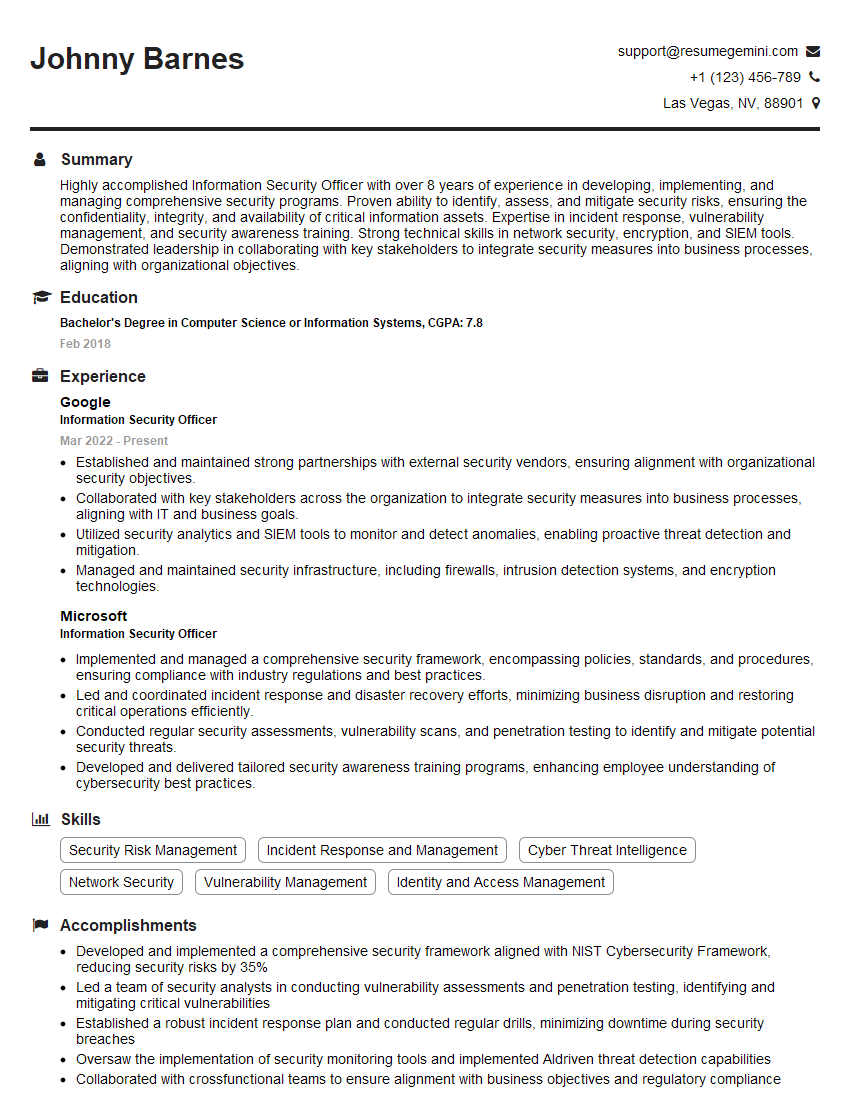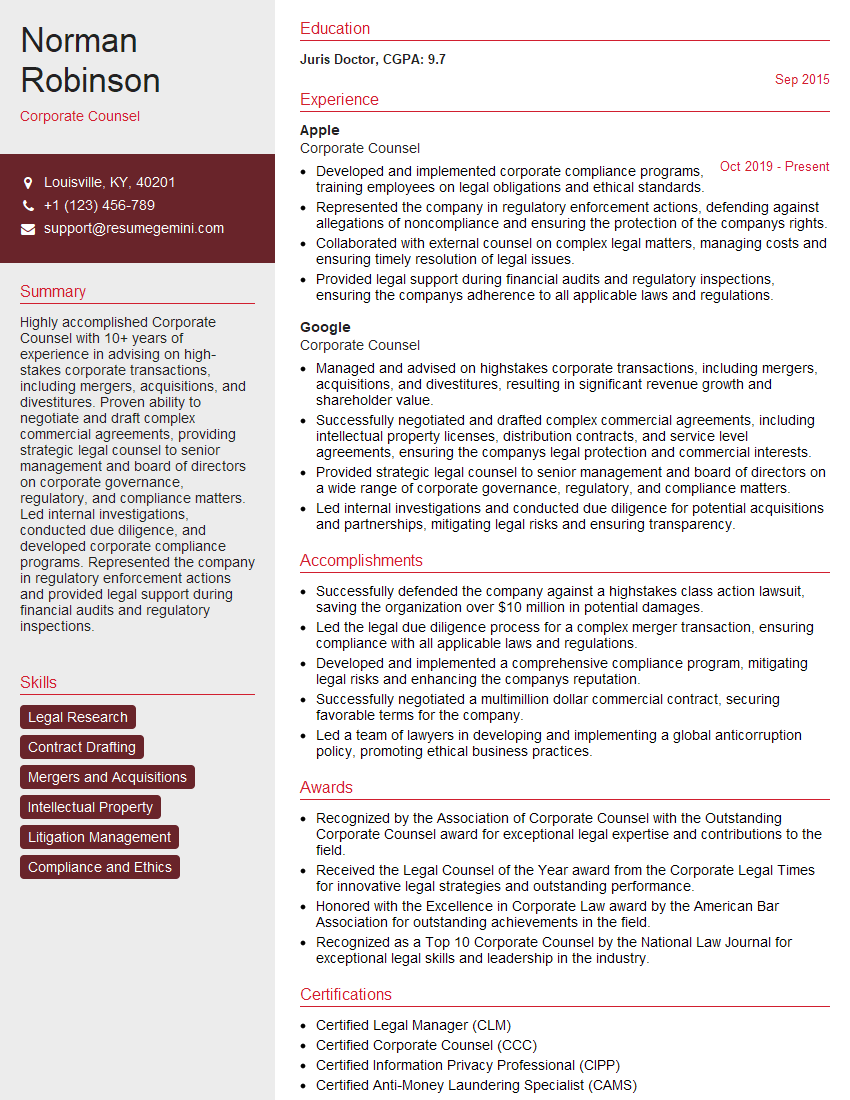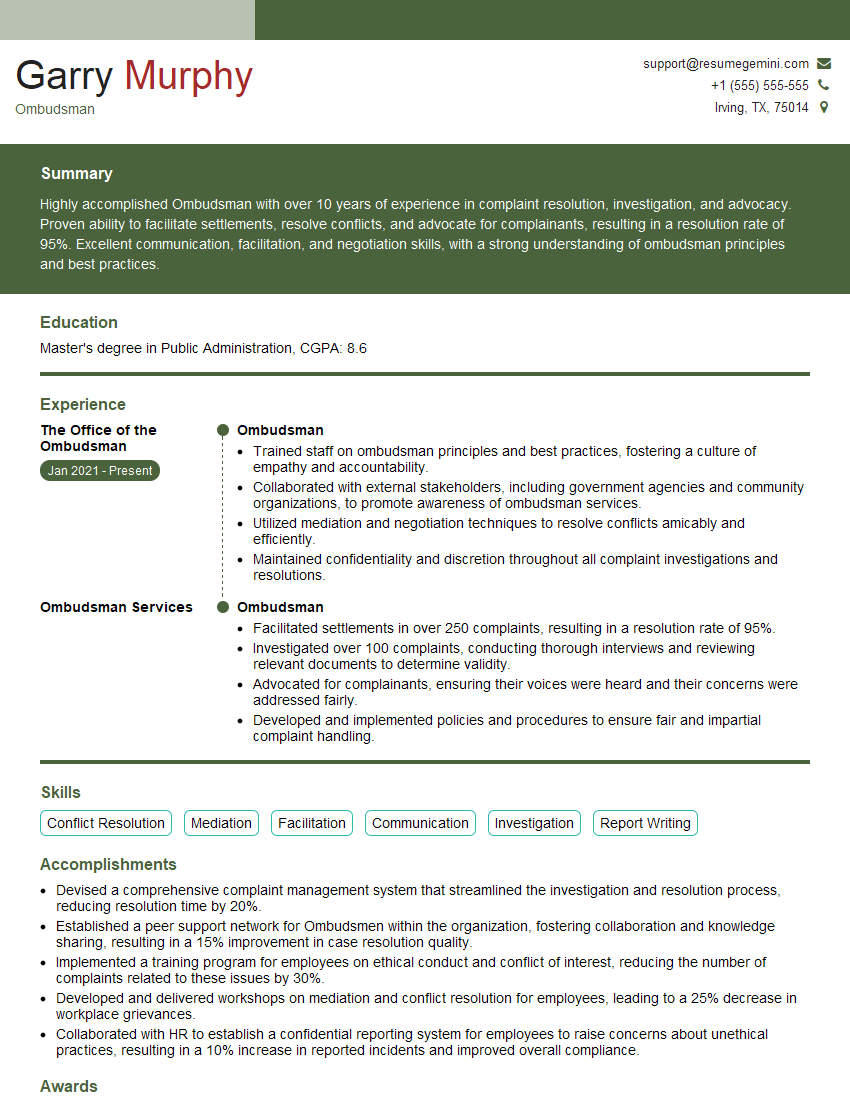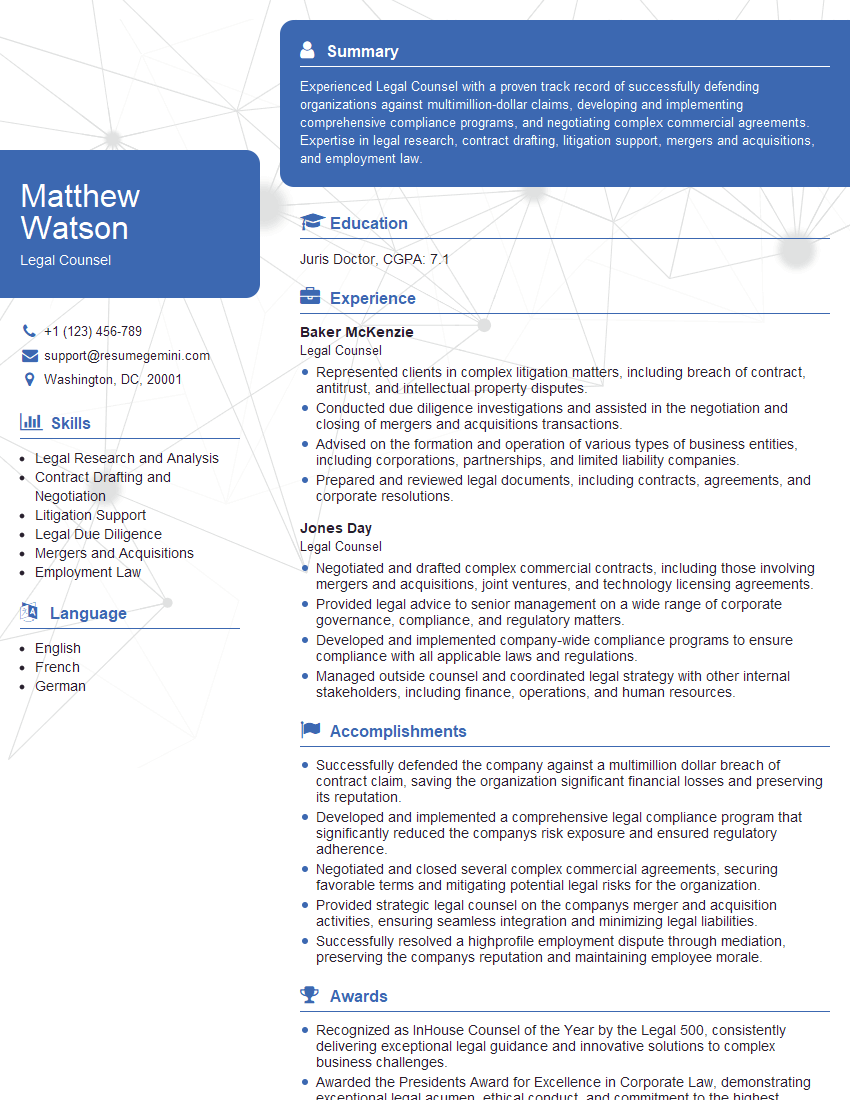Cracking a skill-specific interview, like one for Professional Conduct and Ethics, requires understanding the nuances of the role. In this blog, we present the questions you’re most likely to encounter, along with insights into how to answer them effectively. Let’s ensure you’re ready to make a strong impression.
Questions Asked in Professional Conduct and Ethics Interview
Q 1. Define ‘professional conduct’ in the context of your chosen field.
Professional conduct, in the field of ethics and professional practice, refers to the expected behaviors and actions of individuals within their professional roles. It encompasses a wide range of principles, including integrity, honesty, fairness, respect, responsibility, and accountability. Essentially, it’s about acting in a way that upholds the reputation and trust placed in your profession and its practitioners.
This goes beyond simply adhering to the law. Professional conduct involves demonstrating a commitment to ethical decision-making, even when faced with difficult choices or pressure. For example, a lawyer’s professional conduct mandates confidentiality with client information, even if doing so might inconvenience them or others. A medical professional’s conduct must prioritize patient well-being above personal gain. The key is to maintain the highest standards of behavior and always act in a way that reflects positively on the profession.
Q 2. Describe a situation where you had to uphold ethical standards despite external pressure.
During my time as an ethics consultant for a pharmaceutical company, we faced immense pressure from senior management to downplay some adverse findings from a clinical trial. The results weren’t life-threatening, but they did show a slightly higher-than-expected incidence rate of a minor side effect. Management wanted to omit this information from the report to avoid potential regulatory scrutiny and maintain a positive market image.
However, I strongly believed that withholding this information was unethical and potentially harmful. It was crucial to maintain transparency and integrity in our reporting. I argued that suppressing this data could ultimately erode public trust and damage the company’s reputation long-term. I presented my case to the ethics committee, citing relevant regulations and guidelines. Ultimately, we decided to include the findings in the report with a full and accurate explanation. While this delayed the drug’s approval, it ensured our commitment to ethical standards was upheld, a decision I remain confident in.
Q 3. Explain the importance of a strong code of conduct within an organization.
A strong code of conduct is the bedrock of any organization’s ethical framework. It serves multiple crucial purposes:
- Provides clear guidelines: It spells out expected behaviors, reducing ambiguity and making ethical decision-making less complicated. Think of it as a roadmap for navigating ethical dilemmas.
- Promotes consistency: It ensures everyone within the organization operates under the same ethical principles, fostering fairness and equity.
- Builds trust: It demonstrates a commitment to ethical behavior, both internally among employees and externally with clients, stakeholders, and the public.
- Reduces risk: By setting clear boundaries, a strong code of conduct helps mitigate the risk of legal and reputational damage associated with unethical conduct. This can save the organization financially and reputationally.
- Enhances reputation: An organization with a robust ethical framework is often viewed as more responsible and trustworthy, attracting and retaining both employees and clients who value ethical business practices.
Ultimately, a well-defined and effectively implemented code of conduct helps to create a positive, productive, and ethical organizational culture.
Q 4. How would you handle a conflict of interest situation?
A conflict of interest arises when personal interests clash with professional obligations. The first step is disclosure. If I find myself in such a situation, I would immediately disclose the potential conflict to my supervisor or the relevant authority. Transparency is key. Next, I would carefully assess the situation, weighing the potential impact of my personal interest on my professional judgment and objectivity.
Depending on the severity and nature of the conflict, different actions might be necessary. This could include recusal, meaning I would remove myself from any decisions related to the matter to ensure impartiality. In some cases, it might be necessary to seek advice from an ethics committee or legal counsel. The goal is always to prioritize ethical conduct and avoid even the appearance of impropriety. The ethical solution must prioritize the interests of those I serve professionally.
Q 5. What are the key components of a robust compliance program?
A robust compliance program is multifaceted. It requires:
- Clear policies and procedures: These must cover all relevant laws, regulations, and ethical standards applicable to the organization’s operations. The policies must be readily accessible and understandable.
- Effective training and communication: Regular training programs must educate employees about compliance policies and procedures, fostering a culture of compliance. Effective communication channels should be established for employees to report concerns without fear of retaliation.
- Risk assessment and monitoring: The program must identify potential compliance risks and establish mechanisms to monitor compliance effectively. Regular audits and reviews are crucial.
- Disciplinary procedures: Clear and consistent disciplinary actions should be in place to address violations of compliance policies. This ensures accountability and discourages unethical behavior.
- Independent oversight: Ideally, an independent body (e.g., an ethics committee or external auditor) should oversee the compliance program to ensure its effectiveness and objectivity.
A strong compliance program is a proactive, not reactive, endeavor. It is about preventing problems before they arise, rather than just responding to them.
Q 6. Describe your experience with whistleblowing policies and procedures.
My experience with whistleblowing policies has been largely focused on ensuring that such policies are accessible, understandable, and most importantly, protect whistleblowers from retaliation. I’ve been involved in developing and reviewing whistleblowing procedures for several organizations, always emphasizing the importance of confidentiality and a clear process for reporting concerns. A well-designed system includes multiple reporting channels (e.g., anonymous hotlines, internal reporting officers) to encourage employees to report potential misconduct without fear of retribution.
It’s crucial that the process is thorough and impartial, ensuring that reported concerns are investigated promptly and thoroughly, with appropriate disciplinary action taken when warranted. Protecting the identity of whistleblowers is paramount; their role in maintaining ethical standards within an organization cannot be understated. The goal is to create a system where reporting misconduct is not only encouraged but also feels safe and effective.
Q 7. How do you stay informed on current ethical and legal standards in your field?
Staying updated on ethical and legal standards in my field is an ongoing process. I rely on several key methods:
- Professional organizations: Membership in relevant professional organizations (like the Society for Business Ethics) provides access to publications, conferences, and continuing education opportunities that highlight current issues and best practices.
- Legal updates and journals: I regularly review legal updates and journals focused on business ethics, compliance, and relevant legislation to track changes in laws and regulations.
- Industry publications and news: Staying informed about current events and trends in my field through industry publications, news outlets, and blogs helps me understand the evolving ethical landscape.
- Networking and collaborations: Networking with colleagues and experts through conferences and workshops provides opportunities to discuss emerging issues and best practices.
- Continuing education: Regularly pursuing continuing education credits in ethics and compliance ensures my knowledge stays current and relevant.
It’s crucial to be proactive in this effort, as ethical and legal standards are constantly evolving. Staying informed isn’t just a professional obligation; it’s a cornerstone of responsible practice.
Q 8. Explain the difference between legal compliance and ethical conduct.
Legal compliance refers to adhering to laws and regulations, while ethical conduct involves acting in accordance with moral principles and values. Think of it this way: the law sets a minimum standard of behavior, while ethics sets a higher, aspirational standard. Something can be perfectly legal but still ethically questionable. For example, a company might legally minimize its tax burden through loopholes, but ethically, it might be expected to contribute more to society. Conversely, an action might be illegal but ethically justifiable, such as civil disobedience in the face of unjust laws.
Legal compliance is usually externally enforced through fines or legal action, whereas ethical conduct relies on internal moral compasses and societal expectations. Maintaining ethical conduct strengthens reputation and trust, leading to long-term success, even if it sometimes means forgoing short-term gains.
Q 9. How would you address unethical behavior observed by a colleague?
Addressing unethical behavior observed in a colleague requires a nuanced approach. First, I’d gather as much factual information as possible to ensure I’m not misinterpreting the situation. Then, I’d consider the severity of the behavior. Minor infractions might warrant a private conversation with the colleague, emphasizing the company’s code of conduct and the potential consequences. I would focus on restorative justice, aiming to understand their perspective and guide them towards better conduct.
For more serious breaches, reporting through the appropriate channels – whether it’s a manager, HR, or a designated ethics hotline – becomes essential. This ensures a fair investigation and protects both the organization and the individual reporting the issue. Maintaining confidentiality and focusing on the facts are crucial throughout the process. Reporting is not tattling; it’s about protecting the integrity of the workplace.
Q 10. Discuss the importance of corporate social responsibility.
Corporate Social Responsibility (CSR) is a company’s commitment to operate ethically and contribute positively to society. It goes beyond simply complying with laws; it’s about actively considering the impact of business operations on all stakeholders—employees, customers, communities, and the environment. CSR initiatives can range from environmental sustainability programs to fair labor practices, charitable donations, and ethical sourcing of materials.
The importance of CSR is multifaceted. It enhances a company’s reputation and brand image, attracting customers and investors who value ethical practices. It can also improve employee morale and engagement, leading to increased productivity and retention. Furthermore, strong CSR initiatives can mitigate risks associated with negative publicity or legal challenges arising from unethical behavior. Ultimately, a strong CSR commitment creates a more sustainable and responsible business model.
Q 11. What is your understanding of data privacy regulations and best practices?
Data privacy regulations, like GDPR (General Data Protection Regulation) and CCPA (California Consumer Privacy Act), aim to protect individuals’ personal information. These regulations dictate how organizations can collect, store, use, and share data, emphasizing transparency, consent, and security. Best practices go beyond mere compliance; they proactively prioritize data protection.
My understanding includes implementing robust security measures to prevent data breaches (encryption, access controls), obtaining explicit consent for data collection, providing clear and accessible privacy policies, and ensuring data minimization (only collecting necessary data). Regular data audits and employee training on data privacy are also vital. Failure to comply with these regulations and best practices can lead to significant fines, reputational damage, and loss of customer trust. Data privacy isn’t just a legal matter; it’s a fundamental ethical responsibility.
Q 12. How would you assess the ethical implications of a new business initiative?
Assessing the ethical implications of a new business initiative involves a structured approach. First, I’d identify all stakeholders affected by the initiative – employees, customers, competitors, communities, and the environment. Then, I would analyze the potential positive and negative impacts on each stakeholder group, considering factors like fairness, transparency, sustainability, and respect for human rights.
Using frameworks like utilitarianism (maximizing overall good) or deontology (adhering to moral duties) can help guide the analysis. A cost-benefit analysis might be useful but should not solely dictate the decision; ethical considerations often outweigh purely financial ones. Finally, documentation of the ethical review process and any mitigating measures implemented demonstrates a commitment to responsible business practices.
Q 13. Describe a situation where you had to make a difficult ethical decision.
In a previous role, I faced a situation where a team member was falsifying data to meet performance targets. While the pressure to perform was high, I knew that compromising data integrity was unethical and potentially illegal. It was a difficult decision because reporting this colleague could have impacted their career and our team’s immediate performance.
After careful consideration, I decided to report the issue to my manager, focusing on the facts and avoiding personal judgment. We worked together to address the situation, ensuring a fair process for the team member while upholding the company’s ethical standards. This highlighted the importance of ethical leadership, transparency and a supportive reporting structure within the workplace.
Q 14. What steps would you take to investigate an ethical violation?
Investigating an ethical violation requires a systematic approach. First, I would secure all relevant information, including witness statements, documents, and any digital evidence. Then, I’d establish a timeline of events and identify key individuals involved. The investigation must be impartial, following established procedures and ensuring due process for all parties involved.
Throughout the process, confidentiality needs to be maintained to protect individuals’ reputations and ensure fairness. Depending on the severity of the violation, external expertise (legal counsel or a specialized investigator) might be required. The goal is not just to determine guilt or innocence, but also to understand the root cause of the violation and implement preventive measures to avoid future occurrences. The outcome should be documented thoroughly, with clear recommendations for corrective actions.
Q 15. How do you prioritize competing ethical obligations?
Prioritizing competing ethical obligations requires a systematic approach. Think of it like a skilled air traffic controller managing multiple planes – each with its own flight path and urgency. You can’t simply favor one over the other without considering potential collisions (negative consequences). A useful framework is to apply a structured ethical decision-making model, such as the following:
- Identify the competing obligations: Clearly define each ethical principle involved. For instance, you might have a duty of confidentiality versus a duty to warn someone of potential harm.
- Analyze the potential consequences of each action: Consider the short-term and long-term impacts of prioritizing one obligation over another. What are the risks and benefits of each choice? Who will be affected, and how?
- Weigh the ethical principles: Determine which ethical principle is more compelling in this specific situation. This might involve considering factors like the severity of potential harm or the strength of the relevant professional codes of conduct.
- Seek guidance if needed: Consult with colleagues, mentors, or ethics committees when facing particularly complex dilemmas. A fresh perspective can be invaluable.
- Document your decision-making process: Keep a record of your reasoning for future reference and accountability. This is crucial for transparency and demonstrating responsible decision-making.
Example: Imagine a therapist learning that a client is planning to harm another person. The competing obligations are confidentiality and the duty to protect. While confidentiality is paramount, the potential for serious harm necessitates prioritizing the duty to protect, possibly involving legal authorities.
Career Expert Tips:
- Ace those interviews! Prepare effectively by reviewing the Top 50 Most Common Interview Questions on ResumeGemini.
- Navigate your job search with confidence! Explore a wide range of Career Tips on ResumeGemini. Learn about common challenges and recommendations to overcome them.
- Craft the perfect resume! Master the Art of Resume Writing with ResumeGemini’s guide. Showcase your unique qualifications and achievements effectively.
- Don’t miss out on holiday savings! Build your dream resume with ResumeGemini’s ATS optimized templates.
Q 16. Explain the role of an ethics officer within an organization.
An ethics officer acts as a central figure in upholding ethical standards within an organization. They are the conscience of the company, responsible for developing, implementing, and monitoring the ethics program. Their role is multifaceted and includes:
- Developing and implementing ethics policies and procedures: Creating clear guidelines, codes of conduct, and training programs that align with the organization’s values and legal obligations.
- Providing ethics education and training: Ensuring that all employees understand and are comfortable applying ethical principles in their daily work.
- Conducting ethics investigations: Investigating reported ethical violations, gathering evidence, and recommending appropriate actions.
- Offering ethical guidance and consultation: Serving as a resource for employees who are faced with ethical dilemmas, helping them navigate challenging situations.
- Monitoring and evaluating the ethics program: Regularly assessing the effectiveness of the program and making necessary adjustments to improve its impact.
- Reporting to senior management and the board: Keeping leadership informed about ethical issues and the effectiveness of the organization’s efforts to promote ethical behavior.
Essentially, the ethics officer acts as a gatekeeper, ensuring the organization operates ethically and responsibly.
Q 17. What measures would you implement to foster a culture of ethical behavior?
Cultivating a culture of ethical behavior requires a multi-pronged approach, going beyond simply having a code of conduct. It needs to be woven into the fabric of the organization. Key measures include:
- Leadership commitment: Ethical behavior starts at the top. Leaders must visibly champion ethical principles and demonstrate integrity in their actions. Hypocrisy is the quickest way to erode trust.
- Clear ethical guidelines and codes of conduct: These should be readily accessible, easily understood, and regularly reviewed. They need to be more than just words on paper; they need to reflect the organization’s values in practice.
- Robust ethics training programs: Regular, engaging training should equip employees with the knowledge and skills to navigate ethical challenges. This should include scenario-based learning and real-life case studies.
- Confidential reporting mechanisms: Employees must feel safe reporting ethical violations without fear of reprisal. This requires a clear and accessible whistleblowing system.
- Regular ethics audits and assessments: These provide an objective evaluation of the effectiveness of the ethics program and identify areas needing improvement.
- Recognition and rewards for ethical behavior: Celebrating ethical conduct reinforces positive behavior and encourages others to follow suit.
- Consequences for unethical behavior: A clear and consistent process for addressing ethical violations, including appropriate disciplinary actions, is crucial.
Imagine a company where ethical behavior is not just expected but celebrated. This creates a positive feedback loop, where employees are empowered to do the right thing and are recognized for their integrity.
Q 18. How do you handle situations where ethical guidelines are ambiguous?
Ambiguous ethical guidelines can be challenging, but they require a thoughtful and structured approach. Here’s a process for navigating such situations:
- Identify the ambiguity: Pinpoint the specific aspects of the guideline that are unclear or conflicting.
- Gather information: Seek clarification from relevant sources, such as professional codes of conduct, legal counsel, or senior management.
- Consult with colleagues and mentors: Discuss the situation with trusted individuals to gain diverse perspectives and insights.
- Apply relevant ethical frameworks: Use established ethical frameworks (e.g., utilitarianism, deontology) to analyze the situation and weigh potential consequences.
- Consider potential stakeholders: Identify all individuals or groups who might be affected by your decision and assess their interests.
- Document your reasoning: Clearly articulate your decision-making process, including the information you considered and the rationale for your choice.
- Seek second opinions if necessary: If significant uncertainty remains, seek additional guidance from independent ethics experts.
It’s better to err on the side of caution and choose the option that is most likely to uphold ethical principles, even if it’s not perfectly clear-cut.
Q 19. Describe your approach to conflict resolution in ethical dilemmas.
Resolving conflicts in ethical dilemmas requires careful consideration and a commitment to fairness. My approach involves:
- Active listening: Understanding all perspectives involved is essential. This requires actively listening to all parties involved and seeking clarification where needed.
- Factual analysis: Gathering accurate information is crucial. Avoid assumptions and biases. Stick to the facts.
- Identifying common ground: Look for shared goals or values that can bridge the gap between conflicting viewpoints.
- Negotiation and mediation: Facilitating a dialogue between the parties to find mutually acceptable solutions. This may involve brainstorming alternative solutions.
- Applying ethical principles: Using ethical frameworks and professional codes of conduct to guide the decision-making process.
- Documentation: Keeping a record of the conflict, the steps taken to resolve it, and the outcome.
The goal is to find a solution that respects ethical principles, minimizes harm, and promotes fairness to all involved. Compromise may be necessary, but it shouldn’t compromise ethical integrity.
Q 20. How do you ensure ethical considerations are incorporated into decision-making processes?
Integrating ethical considerations into decision-making is not an afterthought; it must be a fundamental part of the process. I advocate for a structured approach:
- Identify ethical implications: At the outset of any decision, carefully consider the potential ethical ramifications. This includes identifying potential stakeholders and their interests.
- Consult relevant ethical guidelines: Refer to organizational policies, professional codes of conduct, and legal requirements.
- Apply ethical decision-making frameworks: Use models like the Potter Box or the Kidder’s Ethical Checklist to systematically evaluate the ethical dimensions of the decision.
- Assess potential consequences: Consider the short-term and long-term impacts of different options on all relevant parties.
- Document the ethical considerations: Maintain a record of the ethical factors considered and the rationale behind the chosen course of action. This ensures transparency and accountability.
- Monitor outcomes: After making the decision, monitor its effects to ensure that the chosen course of action aligns with ethical principles.
Ethical decision-making is not just about avoiding harm; it’s about striving to achieve positive outcomes that benefit all stakeholders while upholding ethical values.
Q 21. What resources do you utilize to stay informed about ethical issues?
Staying current on ethical issues is crucial. My approach involves multiple resources:
- Professional organizations: Membership in relevant professional organizations provides access to publications, conferences, and continuing education opportunities that address contemporary ethical challenges.
- Journals and academic publications: Staying informed about research and scholarly discussions on ethical issues is vital. This offers in-depth analyses and perspectives.
- Legal updates and case law: Keeping abreast of relevant legislation, court decisions, and regulatory changes is essential for understanding the legal framework surrounding ethical conduct.
- Ethics newsletters and online resources: Many organizations and institutions provide online resources, newsletters, and webinars on ethical issues, providing readily accessible updates.
- Networking and mentoring: Discussions with colleagues, mentors, and experts in the field offer valuable insights and diverse perspectives.
Continuous learning is key to navigating the ever-evolving landscape of professional ethics.
Q 22. Discuss the importance of transparency in ethical decision-making.
Transparency in ethical decision-making is paramount because it fosters trust, accountability, and fairness. When decisions are made openly and honestly, with clear communication of the reasoning behind them, it builds confidence among stakeholders – employees, clients, and the public. A lack of transparency breeds suspicion and undermines the integrity of the organization.
For example, imagine a company deciding to outsource jobs. A transparent approach would involve open communication with employees about the reasons for the decision, the process involved, and the support offered to affected workers. This transparency, while potentially difficult, minimizes resentment and fosters a more collaborative environment. Conversely, a secretive approach can damage morale and reputation.
Transparency isn’t just about disclosing information; it’s about ensuring that information is accessible and understandable. It involves establishing clear ethical guidelines, providing ethics training, and creating mechanisms for reporting and addressing ethical concerns. Think of it as a three-legged stool: open communication, accessible information, and clear reporting mechanisms are all crucial for a truly transparent ethical framework.
Q 23. How would you handle a situation where your personal values conflict with company policy?
Conflicts between personal values and company policy are unfortunately common. Handling them ethically requires careful consideration and a proactive approach. The first step is to understand the nature of the conflict. Is it a minor difference of opinion, or a significant ethical dilemma? I would begin by carefully reviewing the company’s code of conduct and relevant policies. If the policy is ambiguous or seems to contradict established ethical principles, I would seek clarification from my supervisor or the ethics committee.
If clarification doesn’t resolve the conflict, I would consider the potential consequences of my actions. What are the risks to the company, my career, and my personal values? Documenting my concerns and attempting to resolve them internally is crucial. If internal resolution proves impossible and the conflict involves serious ethical violations, I might have to consider escalating the issue to a higher authority or even considering alternative employment. Ultimately, the goal is to act with integrity, maintaining both my personal values and a professional approach to the situation. It’s important to remember that ‘whistleblowing’ is a last resort, but sometimes a necessary one.
Q 24. Describe your experience with developing and implementing ethical training programs.
In a previous role, I was instrumental in developing and implementing an ethics training program for over 100 employees. The program focused on interactive workshops, realistic case studies, and online modules to ensure engagement and knowledge retention. We used a blended learning approach, combining in-person sessions with online resources, to cater to different learning styles.
The program covered topics such as conflict of interest, confidentiality, data privacy, and responsible use of company resources. We incorporated interactive elements like role-playing scenarios and group discussions to encourage active participation. We also established a clear reporting mechanism for ethical concerns, ensuring that employees felt comfortable raising issues without fear of retaliation. Post-training assessments and regular follow-ups helped measure the program’s effectiveness and identify areas for improvement. The success of the program was evident in an increased awareness of ethical issues and a more open and responsible work environment.
Q 25. What are some common challenges in maintaining high ethical standards in the workplace?
Maintaining high ethical standards in the workplace presents several challenges. One common challenge is pressure to compromise ethical principles to meet unrealistic deadlines or performance goals. This ‘pressure cooker’ environment can lead to cutting corners and unethical behavior. Another challenge is a lack of awareness or understanding of ethical guidelines. Employees might unintentionally engage in unethical conduct simply because they don’t know better.
Furthermore, a culture of silence or a fear of retaliation can prevent employees from reporting unethical behavior. This creates an environment where unethical conduct can flourish unchecked. Finally, inconsistent application of ethical standards – where some individuals or teams are held to different standards – can erode trust and fairness. Addressing these challenges requires a strong ethical culture, clear guidelines, robust reporting mechanisms, and consistent enforcement.
Q 26. How do you ensure that ethical considerations are included in risk assessment?
Ethical considerations are integral to a comprehensive risk assessment. Ignoring ethical aspects can lead to significant reputational damage, legal issues, and loss of stakeholder trust. I ensure that ethical considerations are integrated throughout the risk assessment process by specifically identifying potential ethical risks, such as bribery, corruption, discrimination, or data breaches.
For example, when assessing the risk of a new product launch, I would consider potential ethical implications related to its environmental impact, its potential to harm consumers, and its impact on fair competition. These ethical risks are then assessed and prioritized alongside other operational and financial risks. Mitigation strategies are developed to address these ethical risks, and these strategies are integrated into the overall risk management plan. Ethical considerations are not an afterthought; they are a critical element in every step of the process.
Q 27. How do you measure the effectiveness of an organization’s ethics program?
Measuring the effectiveness of an organization’s ethics program requires a multifaceted approach. We can’t solely rely on subjective measures. Instead, a combination of quantitative and qualitative data is needed. Quantitative data might include the number of reported ethical violations, the rate of disciplinary actions taken, and the results of employee surveys assessing ethical awareness and confidence in reporting mechanisms.
Qualitative data comes from focus groups, interviews, and analysis of internal communications to gauge the overall ethical climate. Are employees comfortable raising concerns? Do they believe that ethical violations are addressed consistently and fairly? This approach allows us to not only assess the program’s immediate impact but also its longer-term influence on organizational culture. Regular audits and reviews of the program’s policies and procedures are crucial for continuous improvement and adaptation to evolving circumstances.
Q 28. Describe a time you had to report unethical behavior
In a previous role, I witnessed a colleague falsifying expense reports. After carefully considering the situation and consulting company policy, I reported the behavior to my supervisor using the company’s established reporting channels. This involved documenting all the evidence I had gathered, ensuring a detailed and accurate account of the events. The company conducted a thorough investigation and took appropriate disciplinary action. While reporting this behavior was difficult, I felt it was essential to uphold the company’s ethical standards and maintain a fair and transparent workplace. It demonstrated my commitment to integrity and adherence to ethical principles, even when it involved challenging a colleague.
Key Topics to Learn for Professional Conduct and Ethics Interview
- Professionalism and Workplace Etiquette: Understanding the nuances of professional communication, both written and verbal, appropriate workplace attire, and respectful interactions with colleagues and clients. Consider practical applications like handling difficult conversations or navigating office politics.
- Ethical Decision-Making Frameworks: Familiarize yourself with common ethical frameworks (e.g., utilitarianism, deontology) and their application in real-world scenarios. Practice analyzing ethical dilemmas and formulating justifiable solutions.
- Confidentiality and Data Privacy: Learn the importance of maintaining confidentiality, adhering to data protection regulations, and understanding the ethical implications of data handling in your profession. Consider case studies demonstrating responsible data management.
- Conflict of Interest and Bias: Understand how to identify and manage potential conflicts of interest, both personal and professional. Explore strategies for mitigating unconscious bias and ensuring fair and equitable treatment in the workplace.
- Integrity and Accountability: Explore the significance of acting with integrity in all aspects of your work. Understand the importance of taking responsibility for your actions and decisions, even when faced with challenging situations.
- Compliance and Legal Regulations: Gain a foundational understanding of relevant laws and regulations pertaining to your profession and how they relate to ethical conduct. Focus on practical application of these regulations in daily work.
Next Steps
Mastering Professional Conduct and Ethics is crucial for career advancement. It demonstrates your commitment to integrity, trustworthiness, and responsible decision-making – qualities highly valued by employers. To significantly boost your job prospects, creating an ATS-friendly resume is essential. This ensures your application gets noticed by recruiters and hiring managers. We strongly recommend using ResumeGemini to build a powerful and effective resume. ResumeGemini offers a user-friendly platform and provides examples of resumes tailored to highlight skills and experience in Professional Conduct and Ethics, helping you present yourself in the best possible light.
Explore more articles
Users Rating of Our Blogs
Share Your Experience
We value your feedback! Please rate our content and share your thoughts (optional).
What Readers Say About Our Blog
Hello,
We found issues with your domain’s email setup that may be sending your messages to spam or blocking them completely. InboxShield Mini shows you how to fix it in minutes — no tech skills required.
Scan your domain now for details: https://inboxshield-mini.com/
— Adam @ InboxShield Mini
Reply STOP to unsubscribe
Hi, are you owner of interviewgemini.com? What if I told you I could help you find extra time in your schedule, reconnect with leads you didn’t even realize you missed, and bring in more “I want to work with you” conversations, without increasing your ad spend or hiring a full-time employee?
All with a flexible, budget-friendly service that could easily pay for itself. Sounds good?
Would it be nice to jump on a quick 10-minute call so I can show you exactly how we make this work?
Best,
Hapei
Marketing Director
Hey, I know you’re the owner of interviewgemini.com. I’ll be quick.
Fundraising for your business is tough and time-consuming. We make it easier by guaranteeing two private investor meetings each month, for six months. No demos, no pitch events – just direct introductions to active investors matched to your startup.
If youR17;re raising, this could help you build real momentum. Want me to send more info?
Hi, I represent an SEO company that specialises in getting you AI citations and higher rankings on Google. I’d like to offer you a 100% free SEO audit for your website. Would you be interested?
Hi, I represent an SEO company that specialises in getting you AI citations and higher rankings on Google. I’d like to offer you a 100% free SEO audit for your website. Would you be interested?
good
